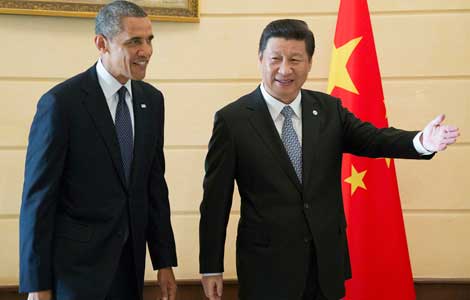Manila makes misguided move
Updated: 2013-09-07 08:29
By Zhang Zuxing (China Daily)
|
||||||||
Arbitral Tribunal has no jurisdiction to deal with the case of the Philippines against China over claims in South China Sea
The Arbitral Tribunal of the United Nations constituted under Annex VII of the 1982 UN Convention on the Law of the Sea, presided by Thomas Mensah, international maritime and environmental law advisor, is on its way to deal with the case brought about by the Philippines government against China. As a general principle, if one of the parties to the dispute does not appear before the tribunal - before making its award - the tribunal must first satisfy itself that it has jurisdiction over the dispute.
This finding of the jurisdictional question can only be based on the provisions of UNCLOS. So when China has refused to accept the jurisdiction of the tribunal according to relevant provisions of UNCLOS, how will it decide its jurisdiction over this case?
The basic reason why the Philippines has resorted to the Arbitral Tribunal is Article 287(3) of UNCLOS, which reads: "A State Party, which is a party to a dispute not covered by a declaration in force, shall be deemed to have accepted arbitration in accordance with Annex VII." In principle, Article 287(3) is based on and limited by Article 286 of UNCLOS, which says: "Application of procedures under this section: Subject to section 3, any dispute concerning the interpretation or application of this Convention shall, where no settlement has been reached by recourse to section 1, be submitted at the request of any party to the dispute to the court or tribunal having jurisdiction under this section."
On the jurisdiction question, the Arbitral Tribunal will have to decide whether or not this case is "a dispute not covered by a declaration in force". In other words, it has jurisdiction over a question that is a dispute in the legal sense and the dispute is "a dispute not covered by a declaration in force". But China made a declaration under Article 298 on Aug 25, 2006, which says the Chinese government "does not accept any of the procedures provided for in Section 2 of Part XV of the Convention with respect to all the categories of disputes referred to in paragraph 1 (a) (b) and (c) of Article 298 of the Convention".
Therefore, none of the categories of disputes referred to in the said paragraphs of Article 298 of the Convention, including those concerning maritime delimitation, can be decided by any international tribunal without the consent of the parties concerned. The reason for these exceptions is not difficult to understand.
The compulsory procedures in the UNCLOS regime are applicable only to "any dispute concerning the interpretation or application of this Convention" (Article 286). And in cases in which there is no meaning to interpret and no rule to apply, such as articles 15, 74 and 83 of UNCLOS, there is no possibility of any international tribunal to adequately exercise its judicial function.
The relief sought by the Philippines, which requests the Arbitral Tribunal to declare "that China's rights in regard to maritime areas in the South China Sea, like the rights of the Philippines, are those that are established by UNCLOS" is obviously not a dispute in the legal sense, because there is no conflict of legal views between the parties in this regard.
For others, for example, to request the Arbitral Tribunal to declare "that China's maritime claims in the South China Sea based on its so-called 'nine dash line' are contrary to UNCLOS and invalid" is obviously a question covered by "a declaration in force".
China's maritime claims, conflicting with the Philippines claims, concern essentially the question of maritime delimitation, which undoubtedly are "disputes concerning the interpretation or application of articles 15, 74 and 83 relating to sea boundary delimitations" under Article 298 of UNCLOS. China has an indisputable right to refuse the jurisdiction of the Arbitral Tribunal based on the provisions of UNCLOS and the declaration it has made under Article 298.
The Philippines' request to declare the status of some of the maritime features is irrelevant for the purpose of imposing the jurisdiction of the Arbitral Tribunal, for these questions can only be decided after the jurisdiction of the tribunal has been justified.
For the reasons given above, the Arbitral Tribunal should find that it has no jurisdiction to deal with the Philippines' case.
Nevertheless, it is not unlawful for the Philippines to invoke Article 287(3) of UNCLOS to raise its case. But the Philippines government has failed to fulfill in good faith its international obligations under Article 2(3) and Article 33 of the UN Charter.
As Estelito P. Mendoza, a well-known Philippine legal expert, has highlighted, the present Philippines' administration did not take any initiative "to settle the problem amicably among the countries with conflicting claims to the area, principally with China". Estelito has said that all of Philippines' efforts, including the filing of petition for arbitration, "have moved us away from the possibility of an amicable settlement of the problem. I would characterize these efforts as needlessly provocative, thus exacerbating the problem." (Philippines Daily Inquirer, May 21, 2013.)
Under general international law, while China is obliged to settle its disputes with other countries through peaceful means, it is not obliged to accept the jurisdiction of any arbitral tribunal to help solve its territorial and maritime problems.
Moreover, according to UNCLOS, China has declared its unwillingness to accept the compulsory process for these problems. Hence, China has the legal right to refuse the jurisdiction of the Arbitral Tribunal. If the tribunal justifies its jurisdiction over the Philippines case, it will seriously violate the provisions of UNCLOS and China's sovereignty. The consequences of this violation will be huge, so the arbitrators should exercise their judicial function wisely.
The author is an associate professor both of International Law and Southeast Asian History at the School of Asia Pacific Studies, Sun Yat-sen University, Guangdong province.
(China Daily 09/07/2013 page5)
Most Viewed
Editor's Picks

|

|

|

|

|

|
Today's Top News
US agencies decry latest Snowden revelations
Obama rejects pressure to abandon Syria plan
Web firms sued for spreading rumors
Open up private market, Li says
Xi warns Abe over Diaoyu Islands
Xi, Obama discuss Asia-Pacific
Smithfield deal passes US review
Think tank seeks G20 secretariat
US Weekly

|

|















